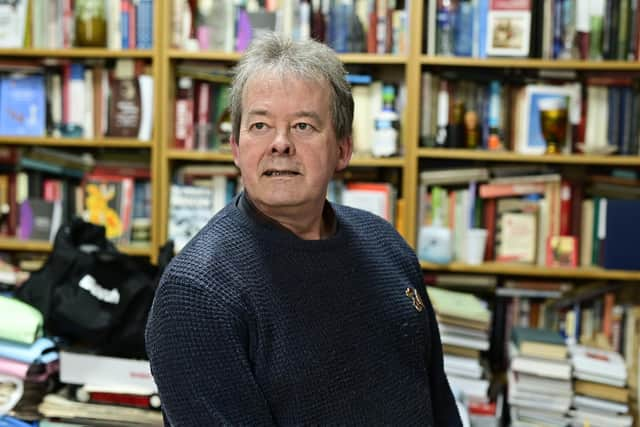The Russian military studies expert studying Vladimir Putin's strategy from his Bathgate archive
Although the MoD appeared in Dr Main’s eyes to no longer view Russia as a threat – at a time when the Kremlin’s outlook appeared to be less internationally-focused – he felt differently.
“I decided to take my redundancy money and come home and set up this wee unit and take it from there,” he recalls.
Advertisement
Hide AdAdvertisement
Hide AdWeeks later, the Russian Military Studies Office (RMSO) was launched. Dr Main took out a small office space in Bathgate and stocked it with his own personal archive of Russian military journals and documents, which he has since grown significantly.


"I set up my own subscriptions to various Russian military journals and started doing what work I could,” he says. Now, he spends his time continuing to research Russian military strategies and foreign policy, writing papers and documents based on Russian primary source materials. The vast majority of his work now once more comes from his former employers at the MoD – but he has recently been approached by authorities from further afield.
“Now the Americans have got interested,” he says. “There were apparently people over there following my work before, but none of them got in touch until the war in Ukraine.”
A graduate of Edinburgh University, Dr Main studied under renowned academic, Professor John Erickson, the former director of Edinburgh University’s Centre for Defence Studies. After leaving academia, and at the height of the Cold War in the 1980s, he moved to an independent research unit within the Ministry of Defence in Sandhurst, which was focusing on Russia, former Soviet countries and the Balkans. The unit was made up of a mix of academics and military personnel.
"We were paid by the MoD, but we didn’t have to toe the party line,” Dr Main remembers. “We were in quite a strong position in the sense that we didn’t have to justify the government defence policy on anything – that wasn’t our job. Our job was to tell the MoD what was happening in the USSR, which then [after the fall of Communism] became the likes of Russia, Belarus, Moldova and Ukraine. Our job was to tell our guys what we thought they needed to know.”
Fluent in Russian, Dr Main used material from Russian military journals and government documents, as well as TV and radio broadcasts to inform the UK Government.
"We had a good reputation, but in the mid 2000s, the MoD decided ‘we don't need all these specialists, this [Russia] isn’t going to be a problem,” he says.
The team was transferred to the centralised Defence Academy of the United Kingdom in Shrivenham – a brainchild of then-prime minister Tony Blair – but interest in Russia had waned further and the unit was disbanded in 2013.
Advertisement
Hide AdAdvertisement
Hide AdHe says: "It didn’t really work, there wasn’t a lot of interest at that point of what was going on inside Russia, which seems a bit stupid now, of course.
"When they broke up the unit, I thought ‘this is a big mistake’. You do need people who are trained, not just in the language, but who have a good understanding of what is happening inside Russia and former Soviet countries.”
Dr Main says he feels the decision to move government focus away from Russia over the past decade has had huge implications for the response to the invasion of Ukraine.
"There’s a lot of official stuff from Russia which is being totally ignored,” he says. “It was apparent after [Russia annexed] Crimea. If they had taken a lot more seriously what Russia was saying and got rid of the mindset that Russia was a busted flush and was never going to be any threat to the West ever again, then we might have made a better of job of what’s going on now.”
Dr Main warns of a tendency in the West to disregard Russian history in favour of hope of a Ukrainian victory.
“There are people saying the regime is on the verge of collapse, but they’re not thinking that through,” he says. “They seem to be dancing on the prospect that the collapse of the regime is imminent. But what happens to people within Russia? If they decide to leave for Poland or another country and you have this massive exodus, how do we cope with that?
"People need to take on board the possibility that Russia could still win this – that has nothing to do with the moral right – but we need to balance what’s coming out on a regular basis in the West with what if Russia wins?
"Our analysis of what’s happening in Russia is too much through a Ukrainian perspective. There’s no justification for the war, but as it moves into another phase, there seems to be his general acceptance that Russia has learned nothing in the past nine months and is going to blunder to defeat.
Advertisement
Hide AdAdvertisement
Hide Ad"I look at Russia and to think that the Russians are intrinsically stupid and have learned nothing flies in the face of Russian military history.
"One of the reasons the RMSO exists – obviously it pre-dates the war in Ukraine – was to feed a bit more intel into the system. This isn’t 1986, this isn’t 1979. The Russians have access to more information than they’ve ever had.”
Comments
Want to join the conversation? Please or to comment on this article.
